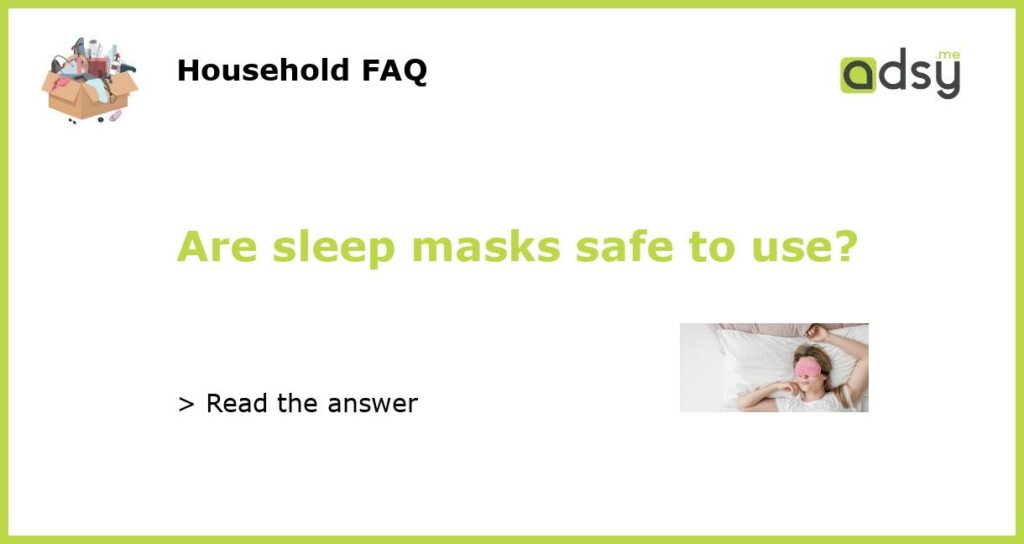Sleep masks: A popular sleep aid
Sleep masks have gained popularity as a sleep aid in recent years. These masks are designed to block out light and create a dark environment, helping individuals fall asleep faster and stay asleep longer. However, many people wonder if sleep masks are safe to use. In this article, we will explore the safety of sleep masks and address some common concerns.
The safety of sleep masks
Generally, sleep masks are considered safe to use. They are made from soft and lightweight materials, such as fabric or foam, which are gentle on the skin and do not cause discomfort during sleep. Sleep masks are designed to be worn over the eyes, providing a complete blackout and promoting uninterrupted sleep.
However, it is important to note that some individuals may experience discomfort or allergies to the materials used in sleep masks. If you have sensitive skin or known allergies, it is recommended to choose a sleep mask made from hypoallergenic materials or consult with a healthcare professional before using one.
The benefits of using sleep masks
There are several benefits to using sleep masks. Firstly, sleep masks create a dark environment, which can be especially helpful for individuals who live in urban areas or work night shifts. Blocking out light can improve sleep quality and reduce the likelihood of being disturbed by external factors.
Secondly, sleep masks can be a useful tool for individuals who struggle with falling asleep or staying asleep. By blocking out light, sleep masks signal to the brain that it is time to sleep, helping to regulate the sleep-wake cycle and promote a faster onset of sleep.
Additionally, sleep masks are portable and easy to use. They can be used at home, while traveling, or in any environment where creating a dark environment may be challenging. Sleep masks are also an affordable sleep aid option compared to other alternatives.
Addressing concerns about sleep masks
Some individuals may have concerns about the safety of using sleep masks. One common concern is the potential for skin irritation or acne breakouts. While sleep masks can sometimes cause pressure on the skin, proper fit and regular cleaning can help mitigate these risks. It is advised to choose a sleep mask that is adjustable to ensure a comfortable and customized fit.
Another concern is the potential disruption of REM sleep. REM sleep, also known as rapid eye movement sleep, is a stage of sleep associated with vivid dreaming and crucial for cognitive function. Some individuals worry that wearing a sleep mask may interfere with the natural eye movements that occur during REM sleep. However, research suggests that sleep masks do not significantly impact REM sleep, and the benefits of uninterrupted sleep outweigh any potential drawbacks.
Tips for safe use of sleep masks
To ensure the safe use of sleep masks, consider the following tips:
- Choose a sleep mask made from hypoallergenic materials if you have sensitive skin or allergies.
- Adjust the sleep mask to a comfortable and secure fit without causing pressure on the eyes or face.
- Regularly clean the sleep mask according to the manufacturer’s instructions to prevent bacteria buildup.
- Avoid wearing sleep masks that are too tight, as they can restrict blood circulation and cause discomfort.
- If you experience any skin irritation or discomfort while using a sleep mask, discontinue use and consult with a healthcare professional.
In conclusion, sleep masks are generally safe to use and can be an effective sleep aid for many individuals. They create a dark environment, promote uninterrupted sleep, and can be especially beneficial for those who struggle with falling asleep or staying asleep. However, it is important to choose a sleep mask made from hypoallergenic materials if you have sensitive skin or known allergies, and to ensure a proper fit and regular cleaning to prevent any potential discomfort or skin issues. As with any sleep aid, it is recommended to consult with a healthcare professional if you have any concerns or underlying sleep disorders.






